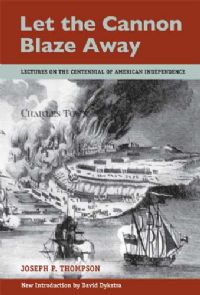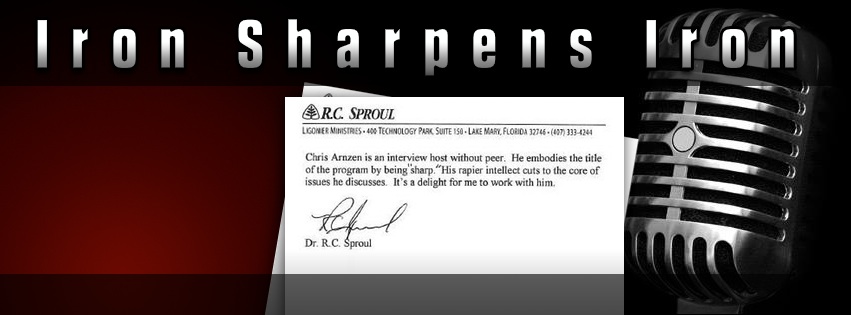




 |
|||||
 |
LET THE CANNON BLAZE AWAY: Lectures on the Centennial of American Independence
Joseph P. Thompson![]()
Rev. Joseph P. Thompson (1819-1879) was long time pastor of The Broadway Tabernacle in NY City. After serving for many years in the United States Dr. Thompson lived and served in Europe. He was living there in 1876 when the United States was about to celebrate its 100th anniversary. He was asked to prepare 6 lectures to be delivered in the leading cities of Germany, Italy, France and England. This he did to the overwhelming applause of the leading ministers and statesman of those countiries. In fact, the response was so encouraging that it was insisted that these lectures be placed in a book that could be used as a textbook for years to come.![]()
This volume has been unavailable for more than a century. The time is right for the reappearance of this remarkable book.![]()
"America needs this book at this hour. It is not however, only for Americans. Recall that these were lectures given in Europe and in Britain. I am often amazed at the ignorance of too many Americans regarding our own history. I am often just as amazed at the ignorance of the rest of the world with regard to America and its institutions. Too many Americans today are ashamed of America. Too many non-Americans display a sense of superiority to America. Joseph Thompson's 'Let The Cannon Blaze Away' should go a long way to correct both of these errors." - David Dykstra, from Introduction![]()
AMERICAN HERITAGE FIVE-PACK![]()
OUR LIVES, OUR FORTUNES AND OUR SACRED HONOR by Charles Goodrich![]()
A THEOLOGICAL INTERPRETATION OF AMERICAN HISTORY by Gregg Singer![]()
LET THE CANNON BLAZE AWAY: Lectures on the Centennial of American Independence by Joseph Thompson![]()
THE FORGOTTEN HEROES OF LIBERTY: The Chaplains and Clergy of the American Revolution by J.T. Headley![]()
A BRIEF EXPOSITION OF THE CONSTITUTION OF THE UNITED STATES by John Hart![]()
74S /04 ah5![]()
Nearly 50% Discount![]() SGCB Price: $14.95 (list price $28.00)
SGCB Price: $14.95 (list price $28.00)![]()
Order with AMERICAN HERITAGE FIVE-PACK (50% off)![]() SGCB Price: $67.50 (list price $135.00)
SGCB Price: $67.50 (list price $135.00)![]()
Additional Information
• Introduction to the New Edition
| Introduction to the New Edition |
A few years ago I was in attendance at a mission's conference when the keynote speaker (from South Africa) said the following: "Whenever you leave America, in whatever direction you go, you take a step down morally." Most of the attendees were American pastors, and to say that we were surprised in hearing that assertion would be an understatement. The speaker however, was a pastor himself, an experienced world traveler, and an astute observer of people and the societies and cultures they produce. His assertion was absolutely correct.
Bill Bennett has echoed that pastor's assertion in these words: "A sober, a sophisticated study of our history demonstrates beyond cavil that we have provided more freedom to more people than any nation in the history of mankind; that we have provided a greater degree of equality to more people than any nation in the history of mankind; that we have created more prosperity and spread it more widely, than any nation in the history of mankind; that we have brought more justice to more people than any nation in the history of mankind; that our open, tolerant, prosperous, peaceful society is the marvel and envy of the ages." 1
These kinds of positive assessments can co-exist with mourning over what is wrong in America. We do well to mourn over all the baser aspects of American culture in the twenty-first century. The Lord gave this command to a scribe who stood in the midst of those assigned to destroy the city of Jerusalem: "Go through the midst of the city, even through the midst of Jerusalem, and put a mark on the foreheads of the men who sigh and groan over all the abominations which are being committed in its midst." 2 To the executioners themselves came this sobering command: "Go through the city after him and strike; do not let your eye have pity and do not spare." 3 The only ones to be spared were the people who mourned over Jerusalem's sins. Indifference to moral evil is itself a moral crime.
No American Christian can be pleased with contemporary American culture. At the same time however, we can say with the author of this book: "There are Americans of whom I am ashamed; but I am not ashamed of America. There are things in America for which I blush; but I do not blush to own myself an American." 4
This reprint of Joseph Thompson's Lectures On The Centennial of American Independence comes at a time in our country's history eerily reminiscent of America in 1876. He tells us, for instance, that many Americans traveling abroad "preferred not to be known as Americans, and would gladly exchange their nativity for that of an Englishman, a Frenchman, or a German." 5 It is not much different today. We live in a season of what one writer has called "the moral purism of blaming America first." 6
Thoughtful Americans in 1876 were ashamed of much that was happening in American society. Although he was never charged with impropriety himself, scandal had plagued the administration of President Ulysses S. Grant. On July 6, 1876 newspapers throughout the country reported the defeat of General Custer and his men at the battle of the Little Big Horn. The Indian warfare that had gone on and on, with atrocities committed by both sides, was the daily fare of the newspapers. Whether it was governmental ineffectiveness in protecting pioneers from Indian atrocities, or atrocities committed against the Indians themselves, the effect was the same, in that America looked bad to the rest of the world. Then, there was the disputed election of 1876, a dispute that made the race between George W. Bush and Al Gore seem like child's play. Rutherford B. Hayes won out over Samuel Tilden, but not before a sweetheart deal was struck that removed Federal troops from the south and exposed southern blacks to the terrorism of white supremacy, a terrorism as real, as evil, and as violent as any we know today. 7
1876 was not then a very good year, and yet it was the centennial year. On July 4, 1776 final approval was given by the Continental Congress to the Declaration of Independence. Only John Hancock signed the document that day, but the die was cast and there was no turning back.
Joseph Thompson's Lectures on the Centennial of American Independence is reprinted with a new name, drawn from a statement made by John Hancock. Benedict Arnold and Ethan Allen had captured Fort Ticonderoga and its fiftynine British cannon. Those heavy guns had been brought through the Berkshires to Boston by Henry Knox and his men. On the morning of June 17, 1775, Captain Thomas Bishop of H.M.S. Lively rushed to the quarterdeck to an amazing sight on the heights above Boston. In but one night, fortifications had appeared that were evidently not the work of amateurs. Now, cannons looked down on Boston and on the British fleet. John Hancock, one of the richest men in America, had received a request from General Washington to open fire on Boston. Hancock rose in Congress to say: "Nearly all I have in the world is in the town of Boston; but if the expulsion of the British troops and the liberty of my country demand that my houses be burned to ashes, issue the order and let the cannon blaze away." 8
Let The Cannon Blaze Away is apologetic in form. It is a defense of the American Revolution, the Declaration of Inde-pendence, the Constitution, and our entire form of government.
Joseph Parrish Thompson was a pastor in New York City from 1845 to 1871. He was succeeded in the ministry there by the great William M. Taylor of Scotland. Upon his retirement for health concerns in 1871, Thompson's congregation voted to give him a severance gift of $55,000; a huge sum in that period, and one that indicated something of the love and esteem in which he was held. It was Thompson who was asked to preside over and preach at the funeral of the great J.W. Alexander held in Princeton, NJ on August 3, 1859.
One cannot but admire a man who went to England and from British documents themselves, proved the legitimacy of the American Revolution. He gave lectures in Britain, France, Germany, and Italy, and became a leading apologist in his day of America and its institutions.
In 1848 a great Frenchman spoke of his own country in contrast to America. Here are his words: "In the last sixty years we have changed eight or ten times our government and our constitution; have passed from anarchy to despotism; tried two or three forms of the republic and of monarchy; exhausted proscription, the scaffold, civil and foreign war; and after so many attempts, and attempts made with the fortune and the blood of France, we are hardly more advanced than at the outset. The constitution of 1848 took for its model the constitution of 1791, which had no life; and today we are agitating the same questions that in 1789 we flattered ourselves that we had resolved. How is it that the Americans have organized liberty upon a durable basis, while we, who surely are not inferior to them in civilization--we who have their example before our eyes,--have always miscarried." 9
In Let The Cannon Blaze Away you will learn the answer to Edouard Laboulaye's question. We need this reprint, and we do well to study it. We would also do well in this politically correct time to heed Shelby Steele's advice and "allow the greatness of Western civilization to speak for itself." 10
On a trip to Europe and the Middle East, Mark Twain described the reaction to seeing an American ship in full sail flying the Stars and Stripes. "She came speeding over the sea like a great bird. Africa and Spain were forgotten. All homage was for the beautiful stranger. While everybody gazed, she swept superbly by and flung the Stars and Stripes to the breeze! Quicker than thought, hats and handkerchiefs flashed in the air, and a cheer went up! She was beautiful before--she was radiant now. Many a one on our decks knew then for the first time how tame a sight his country's flag is at home compared to what it is in a foreign land. To see it is to see a vision of home itself and feel a thrill that would stir a very river of sluggish blood." 11
America needs this book at this hour. It is not however, only for Americans. Recall that these were lectures given in Europe and in Britain. I am often amazed at the ignorance of too many Americans regarding our own history. I am often just as amazed at the ignorance of the rest of the world with regard to America and its institutions. Too many Americans today are ashamed of America. Too many non-Americans display a sense of superiority to America. Joseph Thompson's Let The Cannon Blaze Away should go a long way to correct both of these errors.
David Dykstra
Wantage, New Jersey
May, 2005
1 Bill Bennett, Why We Fight, p. 150-151, Doubleday.
2 Ezekiel 9:4.
3 Ezekiel 9:5.
4 Joseph Thompson, Let The Cannon Blaze Away, p. vii.
5 Ibid, p. vii.
6 Jean Bethke Elshtain, Just War Against Terror, Basic Books, p. 91.
7 Stephen Ambrose, To America: Personal Reflections Of An Historian, p. 58ff. Simon and Schuster, NY, NY.
8 Joseph Thompson, Let the Cannon Blaze Away, p. 53.
9 Ibid, p. 107.
10 Bill Bennett, Why We Fight, p. 100.
11 Mark Twain, The Innocents Abroad, BMC, p. 50-51.
